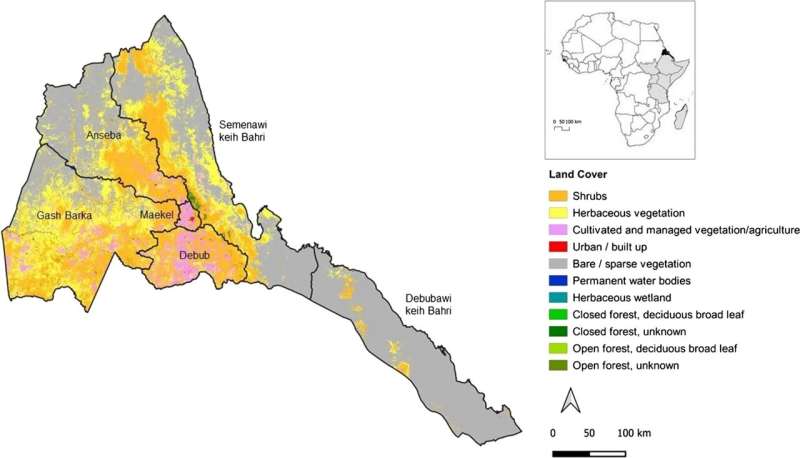Location of Eritrea in the broader East Africa Region and map of land cover in 2019 in the six regions of the country. Data source: Copernicus Global Land Service (Buchhorn et al. 2020). Credit: Ambio (2023). DOI: 10.1007/s13280-023-01841-4
Ecosystems deliver many benefits to humans, such as providing water, fruits and vegetables, as well as recreation opportunities. An international research team conducted a pilot study in Eritrea in order to demonstrate that the mapping and assessment of ecosystems and their services (MAES) is key to inform sustainable policy and decision-making at national and sub-national levels.
Professor Christian Albert's research lab Environmental Analysis and Planning in Metropolitan Regions at Ruhr-University Bochum (Germany) was involved in the study. The researchers recommend that information on ecosystem services be made available to both political stakeholders and the public to enable responsible decision-making. They published their findings in Ambio.
Based on open data
The researchers reviewed policy and legal documents, analyzed land cover changes in Eritrea and estimated the potential for ecosystem services supply through a literature-based and expert-based matrix approach. Their results showed that from 2015 to 2019, the potential supply of the ecosystem services analyzed had slightly increased, with the exception of wood supply. "Based on this, the study provides insights as to where to conserve, develop, or restore ecosystem services supply in Eritrea," says Dr. Blal Adem Esmail.
"The operational methodology is based on open data and software, generating new insights into the dynamics of ecosystems and their services in Eritrea," says Blal Adem Esmail. The results can be integrated into the design of future policies with a direct impact on ecosystem and biodiversity conservation, for example, on System of Economic and Environmental Accounting—Ecosystem Accounting (SEEA-EA) recently adopted by the UN.
"Hopefully, this study will provide a starting point for the assessment of ecosystems and their services in Eritrea and more widely in the East African sub-region and adjacent islands," says the researcher.
Recommendations for implementation in practice
The researchers derive recommendations for practice from their pilot application: the changes in ecosystems and their potential impacts on ecosystem services should be the subject of reflection with the engagement of relevant stakeholders and the public.
"An active engagement can promote a sense of shared responsibility for national development and conservation policies—at both national and sub-regional levels," say the researchers. This, in turn, contributes to the co-creation and management and governance of ecosystems for sustainability.
More information: Blal Adem Esmail et al, Mapping and assessing ecosystem services for sustainable policy and decision-making in Eritrea, Ambio (2023). DOI: 10.1007/s13280-023-01841-4
Journal information: AMBIO
Provided by Ruhr-Universitaet-Bochum
























